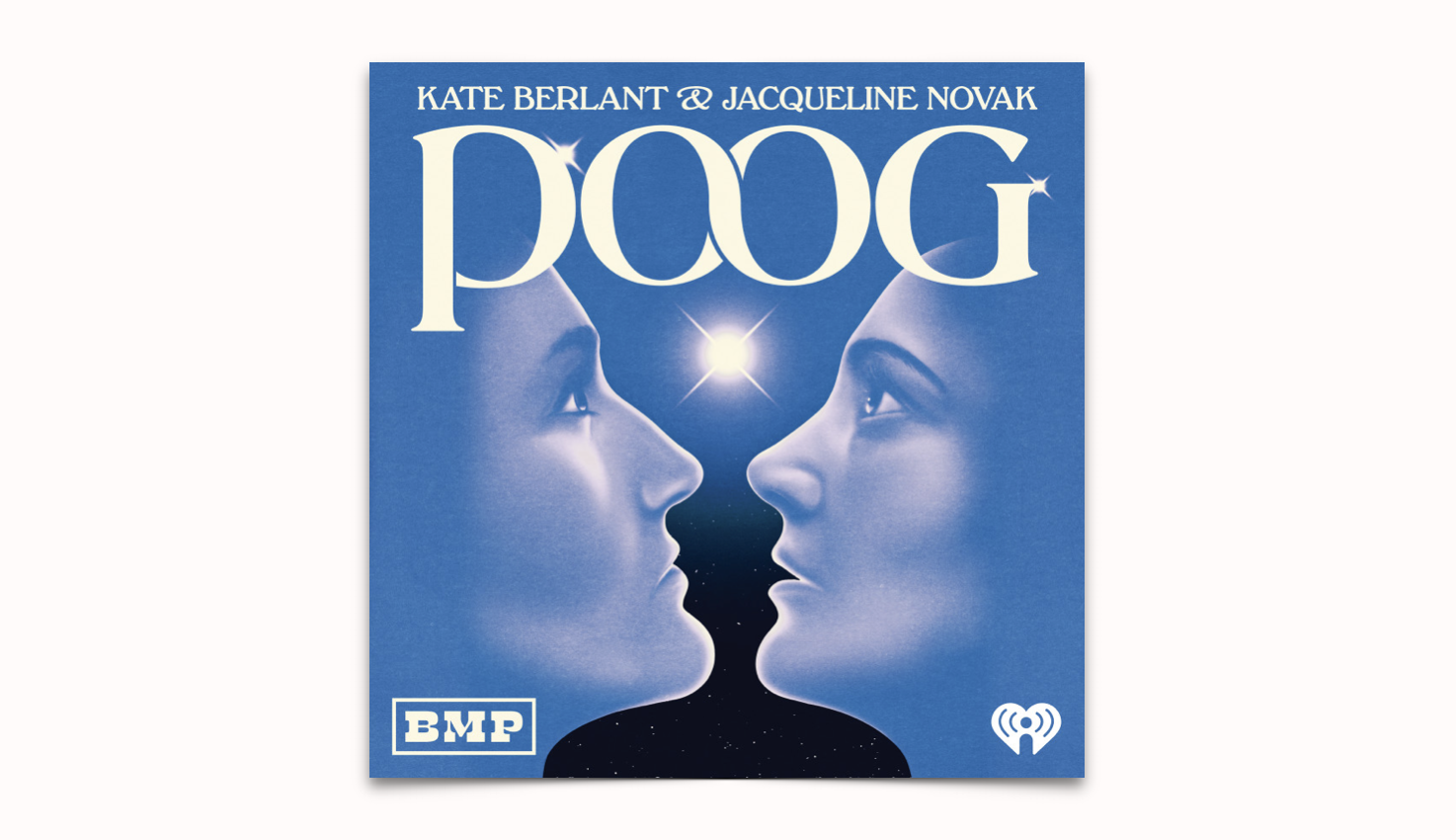Poog is an effort to make it through contemporary life in a body. Most of us have one, even if we’d like to forget about it sometimes. When we’re not trying to forget our bodies, we’re trying to make them more bearable homes, and Kate Berlant and Jacqueline Novak are dedicated to mining every prospect. Poog is a podcast, a conversation between two friends, both accomplished comedians, performers, and thinkers, who share an obsession with the multifaceted industry we call “wellness.” Poog is not a platform for indiscriminate critiques of wellness because Berlant and Novak are too sharp, too provocative to set up facile binaries; simply, they’re not here to crack jokes about crystals. The podcast is a dispatch from within wellness’ engine of desire — what feeds, what self-perpetuates, what promises to solve.
This review does not define wellness, because others have done so better than I could, and because it’s a definition beset from every direction. The accouterments of wellness’s fashions — sometimes materialist or mystical, science-based or anti-science, a feeling, a mood, an aspiration, a color or a minimalist display — are all calibrated to obfuscate how much it is an industry. Attempting to define wellness typically leads a writer to a grab bag of products, philosophies, or cases, each representing an approach to the present moment: What’s the right way to live? What consumer choices that matter? What is secretly hurting you? What are you ignoring that can change your life? And all of it costs.
Berlant and Novak are not above these questions — they live for them. Poogian omnivorousness is the only way to make sense of it. They try serums and kombuchas and water bottles, they rave or decry them, they demand more free samples. The way wellness’ protagonists — entrepreneurs, gurus, therapists, and certifying organizations — sell products has long involved a kind of non-consensus. “Not that, but this” extended to every ailment, old, new, and emerging. So, Poog does not exist to moralize or condemn, but its hosts are realistic about the pressures faced by a certain kind of well-off, relatively young person in America. Even our hard seltzers have antioxidants. They imagine sticking with something that works but are voracious and always in search, which is truer entertainment. They are not curtailed by the scam or the placebo. A sugar pill, after all, has no essential content; it’s the very form of our want for a cure to what ails.
Want to receive our latest podcast reviews and episode recommendations via email? Sign up here for our weekly newsletter.
Berlant and Novak’s conversations, then, are theorizations of a capitalist present from the muck. They are tender, hyperbolic, and tuned-in to how life feels. They try earnestly, drawing from psychoanalysis to mindfulness to metaphysics; they talk the lingo of keto, clean eating, and probiotic deodorant; they delve into gamifications of femininity and corporeal living, as in The Optimized Woman’s disruptive spin on the menstrual cycle, and bear the barrage of ads for “the perfect summer sandal” millennials witness every day we compulsively check Instagram. There’s a deep current of references flowing under Poog that will outpace listeners. You might know what a fasciablaster is and you may have watched Six Feet Under or Grizzly Man, but have you read The Collected Works of C.G. Jung? Have you practiced The Toltec Path of Recapitulation?
Most of all, Berlant and Novak are adventurers, plumbing the depths of their own bodies, searching for answers among coughs and cricks, spots and aches. Berlant and Novak are comedic observers of the petite humiliations and indignities of daily life. They traverse the liminal space of the airport, the freedom from choice of the security line, where all are rendered just bodies, to the recurring fantasy of astral projection, the dream of a liberation complete from the corporeal. Poog is about the various ways these carnal things come into contact, facial brushes and face yoga, organs (and, what does the appendix do anyway?), muscles to be massaged, minds to be meditated and secret mantras, colonics and E. coli, and dreaming, lucidly, of the perfect green smoothie; or off to the outdoors, slathering fleshy exterior in moisturizer and SPF, taking refuge under dark denim, the most dependable protection from sun.
This review isn’t funny, which buries the lede, because Poog is, raucously so. If you give Poog a try, prepare to draw weird looks when you crack into laughter on the bus chasing after Berlant and Novak’s virtuosic digressions, or beckon your partner to hear the uppermost pringle as perfect analogy for a classist society, or feel a little less alone when this pair of geniuses makes material out of their deepest insecurities, desires, and fears. The Poogian is ambivalent and skeptical. They need to be convinced but unabashedly believe. They know better than to try to outthink their own attachments. The thing about wellness is the thing about wants, they come for us all and they don’t stop coming, but Poog offers a way to love the sugar pill, and a laugh when it dissolves.
¤
Jorge Cotte is a writer living in Chicago. His work has appeared in Los Angeles Review of Books, The New Inquiry, and Complex.
